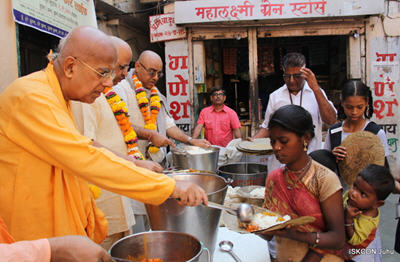|
Act of giving - Charity, Donation or दान Family values, upbringing and religion all play a part in giving in India, with Hinduism mandating giving. Donations reduce attachment to sensual pleasure. Donations are simplest way open all the lumps before death. The detachment begins by donations and forgiveness. However, if charity or donation is inadequate, done with repentance or given to ineligible, then it is worthless. In Vedas, service, charity and benevolence have been attributed to paramount religion. Rigveda (verse – 3.24.5) says, “शतहस्त समाहर सहस्त्र हस्त सं किर” means earn with hundreds of hands and donate with thousands of hands. The World Giving Index (WGI) is an annual report published (2016) by the Charities Aid Foundation, using data gathered by Gallup, and ranks over 140 countries in the world according to how charitable they are. This annual index measures generosity by three factors: the amount of money donated, participation in volunteering, and helping a stranger. Myanmar despite country in lower middle income claims the title of the world’s most generous country consistently for last three years 2014, 2015 & 2016. (USA – 2nd; Australia – 3rd; New Zealand – 4th; Sri Lanka – 5th; India – 91) Top 5 most charitable people in the world are Bill Gates (Net worth 84.2 billion, life time donation $27 billion), Warren Buffett (Net worth: $61 billion, life time donations $21.5 billion), George Soros (Net worth: $24.4 billion, life time donations $8 billion), Azim Premji (Net worth $15.9 billion, life time donations $8 billion) and Charles Francis Feeney (Net worth $1.5 million, life time donation $6.3 billion). In various Hindu scriptures such as Puranas, Mahabharata, Ramcharitramanas etc., importance of donation or daan has been highlighted. Shree Krishna in Shrimad Bhagavad Gita has explained three types of donations as under:
Hindu scriptures have dealt with the various aspects of donations such why donate, what to donate, who to donate, how to donate, when to donate and exemplary stories of donations. Such details with relevant quotations in Sanskrit are as under: Why should be donated?
Who should be donated?
How should be donated?
Stories of donations admired in Hinduism Karna and Yudhistira, both were celebrated donors in Mahabharat times. However, Karna was called as Danveer by Shree Krishna as he set examples of selfless generosity.
Reference:
1 Comment
|
Archives
July 2024
Categories |

 RSS Feed
RSS Feed